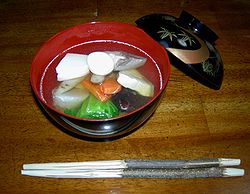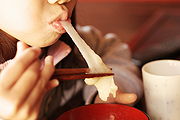- Zōni
-
Zōni (雑煮), often with the honorific "o-" as o-zōni, is a Japanese soup containing mochi rice cakes. The dish is strongly associated with the Japanese New Year and its tradition of osechi ceremonial foods.
It is said that zōni finds its roots in samurai society cuisine. It is thought to be a meal that was cooked during field battles, boiled together with mochi, vegetables and dried foods, among other ingredients. It is also generally believed that this original meal, at first exclusive to samurai, eventually became a staple food of the common people. Zōni was first served as part of a full-course dinner (honzen ryōri), and thus is thought to have been a considerably important meal to samurai.
As for ways of cooking the soup, different regions in Japan sport many variations, but in most cases it is either a clear soup (sumashi-jiru) flavoured with dashi (stock usually made from flakes of dried bonito) and soy sauce, generally preferred in eastern parts of the country, or a miso soup generally preferred in the western parts.
As a rule of thumb, mochi is cut into a rectangle in eastern Japan, whereas in western Japan the mochi is usually round. In some areas sato-imo (taro) or tofu is used instead of mochi. This type of zōni is found on some islands or some mountain areas where rice is not grown to a large extent.
Common additions to the soup include chicken, fish or meatballs; leafy vegetables such as komatsuna or spinach; mitsuba (a Japanese herb similar to parsley); kamaboko such as naruto and carrot flakes for colour; and flakes of yuzu peel for its citrus fragrance. Regional specialties are often added. A sprinkle of seven-spice chili flakes (shichimi) is sometimes added at the table.
See also
- Japanese New Year
- Tteok guk, a similar soup eaten in Korea on New Year's Day
Categories:- Japanese soups and stews
Wikimedia Foundation. 2010.


